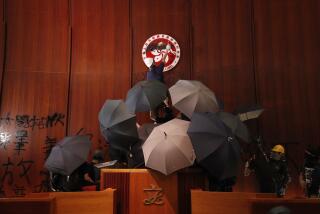New Hong Kong Protests Bolster ‘People Power’
- Share via
BEIJING — Tens of thousands of demonstrators took to Hong Kong’s streets Thursday in support of democracy, strengthening a nascent “people power” movement that has given Beijing and its handpicked representatives headaches.
Although estimates of the crowd’s size differed sharply -- organizers pegged it at 100,000, the government 37,000 -- even the smaller figure far exceeded expectations.
“I’m very pleased and impressed by the high turnout,” said Richard Tsoi, one of the march’s leaders. “It shows the Hong Kong people are very concerned about democracy.”
Organizers were particularly heartened given recent improvements in the local economy. Beijing and its close allies in Hong Kong’s government have made economic recovery a top priority since a July 1 pro-democracy rally attracted 500,000 normally apathetic residents, hoping that self-interest would outweigh people’s interest in collective rights.
In recent months, Beijing has spurred investment in Hong Kong, opened the spigot of tourism from the mainland and reportedly slowed competing development projects in southern China.
Thursday’s marchers were orderly, ambling from a park to the headquarters of Hong Kong Chief Executive Tung Chee-hwa’s government. The turnout was bolstered by the bright, warm day.
Demonstrators included grandparents, parents pushing baby carriages and blocks of people representing local opposition parties waving red, green and yellow ribbons.
“I want to join the voice,” said engineer Lee Tak Ming, 35. “I want the government to listen to us. They said they know our aspirations, but they are still doing the same old thing.”
After the July political jolt and the November drubbing of his pro-Beijing party in district elections, Tung vowed to heed the tide and give residents more say.
Voters select only 24 of 60 district seats, and the chief executive remains an appointed official in a process that favors Beijing’s preferences. Full, direct election of representatives is possibly years away.
Last week, Tung continued to read from what some characterize as Beijing’s script by appointing 102 district council members rather than opening more seats to popular choice.
“The people sent a message, but he ignored it,” said David Zweig, a social scientist at Hong Kong University of Science and Technology. “The government’s dragged its feet.”
On Thursday, the Hong Kong administration repeated its vow to begin consultations on democratic reforms, although it provided no firm timetable. “The government will adopt an open and receptive attitude and encourage discussion,” it said in a statement.
Arguably a more fundamental burr for many Hong Kong residents is Tung’s clunky style and awkward political instincts, seen in his handling of the economy, the severe acute respiratory syndrome epidemic and a Beijing-backed anti-subversion bill.
“Tung is no good,” said Ng Kwok Hung, 40, an accountant who joined the demonstration. “He should go and let us vote for our own chief executive.”
Beijing, however, finds itself in a bind. While it has found itself in the strange position of lecturing Tung on democracy and might be questioning its choice, a sudden departure by the chief executive could embolden Hong Kong’s democracy movement.
It also could mean a loss of face for the Chinese leadership, particularly former President Jiang Zemin, who appointed Tung.
Pro-Beijing Hong Kong leaders and the conservative business community are gambling that in the short term they will be able to keep the situation in check, said Sonny Lo, political science professor at Hong Kong University. “But in the long run, the situation is pretty shaky.”
As a proposed 2007 date for direct elections approaches, Lo said, “I anticipate more demonstrations and even confrontations between demonstrators and police on the streets of Hong Kong.”
China also must consider potential reverberations across the Taiwan Strait. Candidates in the run-up to Taiwan’s March 20 presidential election might cite Hong Kong to bolster their argument that Beijing’s “one nation, two systems” approach doesn’t work -- and that Taiwan should pursue a more independent course.
*
Tammy Wong in The Times’ Hong Kong Bureau contributed to this report.
More to Read
Sign up for Essential California
The most important California stories and recommendations in your inbox every morning.
You may occasionally receive promotional content from the Los Angeles Times.













